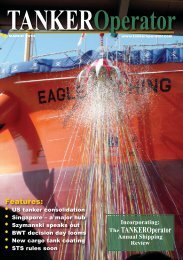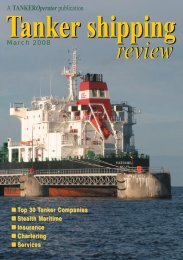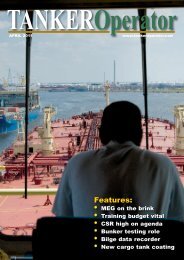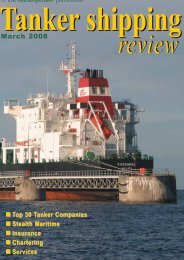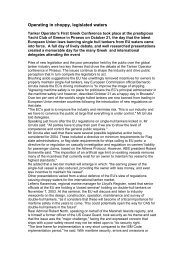Navigation standards slammed - Tanker Operator
Navigation standards slammed - Tanker Operator
Navigation standards slammed - Tanker Operator
Create successful ePaper yourself
Turn your PDF publications into a flip-book with our unique Google optimized e-Paper software.
p7-14.qxd 09/05/2006 10:12 Page 3<br />
TANKER<br />
<strong>Operator</strong><br />
Greeks was steady, though there was<br />
another peak in the run-up to April 1 and<br />
the final introduction of CSR by IACS.<br />
Though Greek complaints finally drew the<br />
fullest explanation of the rules from IACS<br />
just days before their introduction, it must<br />
be noted most concern was expressed over<br />
the rules for bulk carriers. Indeed, as far as<br />
the tanker fraternity is concerned, it was<br />
again evident in March that<br />
the Greeks had accepted the<br />
rules were part of the industry's<br />
future, no matter what<br />
they may think.<br />
Much was made of the<br />
early spring rush to order<br />
tonnage. Brokers and shipyards<br />
claimed it was almost<br />
entirely driven by the pending<br />
introduction of CSR. The<br />
new rules will add several<br />
million US dollars onto the<br />
price of VLCCs and proportionally<br />
more on to the price<br />
tag for highspec ships,<br />
whether big or small.<br />
However, the Greek companies<br />
ordering tankers and<br />
gas carriers were, in the<br />
main, well known in the<br />
energy transportation business<br />
and while being<br />
extremely competitive were<br />
not penny-pinchers. Most<br />
had already invested heavily<br />
in new tonnage and many of<br />
the latest projects that have<br />
been under negotiation.<br />
There had been some accusations<br />
that yards and class<br />
had back-dated contracts to<br />
late March, but noted, Ole<br />
Schnohr, managing director<br />
of MAN B&W (Hellas), "all<br />
the projects had been on the<br />
drawing board for some time<br />
and were due to be signed".<br />
MAN B&W was supplying<br />
over 90% of the engines and<br />
Schnohr said there are many<br />
more projects to be finalised.<br />
Of course, the new rules<br />
have played a big part in<br />
owners' planning, but market<br />
sentiment and the availability<br />
of building berth space had a<br />
bigger influence on deciding<br />
when to order. Further,<br />
according to key equipment<br />
suppliers it was the shipyards,<br />
not class that exerted<br />
the greatest pressure to order.<br />
Despite this, the number<br />
of tanker orders that came to<br />
light in March was truly<br />
mind boggling. Data built up<br />
by the Greek publication,<br />
Newsfront, revealed that at the<br />
end of last year there were<br />
1,550 energy carrying ships of<br />
96 mill dwt on order. By the<br />
beginning of April the world<br />
orderbook had registered a<br />
net gain of 120 ships of 5.78<br />
mill dwt despite the fact ships<br />
were being delivered during<br />
the period. For example,<br />
between January and May,<br />
Greek owners alone took<br />
delivery of 24 tanker newbuildings<br />
of 2.25 mill dwt.<br />
At the beginning of 2006, 40 Greek owners<br />
had 209 energy carrying ships on order.<br />
By the end of April, 35 companies had 212<br />
energy ships on order. In March, shipbrokers,<br />
shipowners and shipbuilders were<br />
reporting the world's tanker industry had<br />
placed contracts for some 96 ships of approx<br />
7.3 mill dwt, for an investment of $4.5 bill.<br />
In addition, options were held for at least 20<br />
more ships.<br />
The overall pre-CSR picture can been<br />
seen from reports from South Korean<br />
shipbuilders that they had reaped a record<br />
$12 bill worth of orders in the first quarter<br />
of 2006, with the country's Commerce<br />
ministry attributing the influx of 136 ships<br />
to a scramble for yard space before April 1.<br />
Orders for tankers ran to 97 of which 65<br />
were for products carriers. Yards in China<br />
also scored well, but were overshadowed<br />
by South Korea.<br />
An idea of price levels for ships ordered<br />
and slated for delivery late 2008 and<br />
into 2010 could be seen from the 318,000-<br />
tonne VLCCs booked at Hyundai at<br />
$120 mill each by Dynacom <strong>Tanker</strong>s<br />
<strong>Tanker</strong><strong>Operator</strong> May/June 2006 page 9






